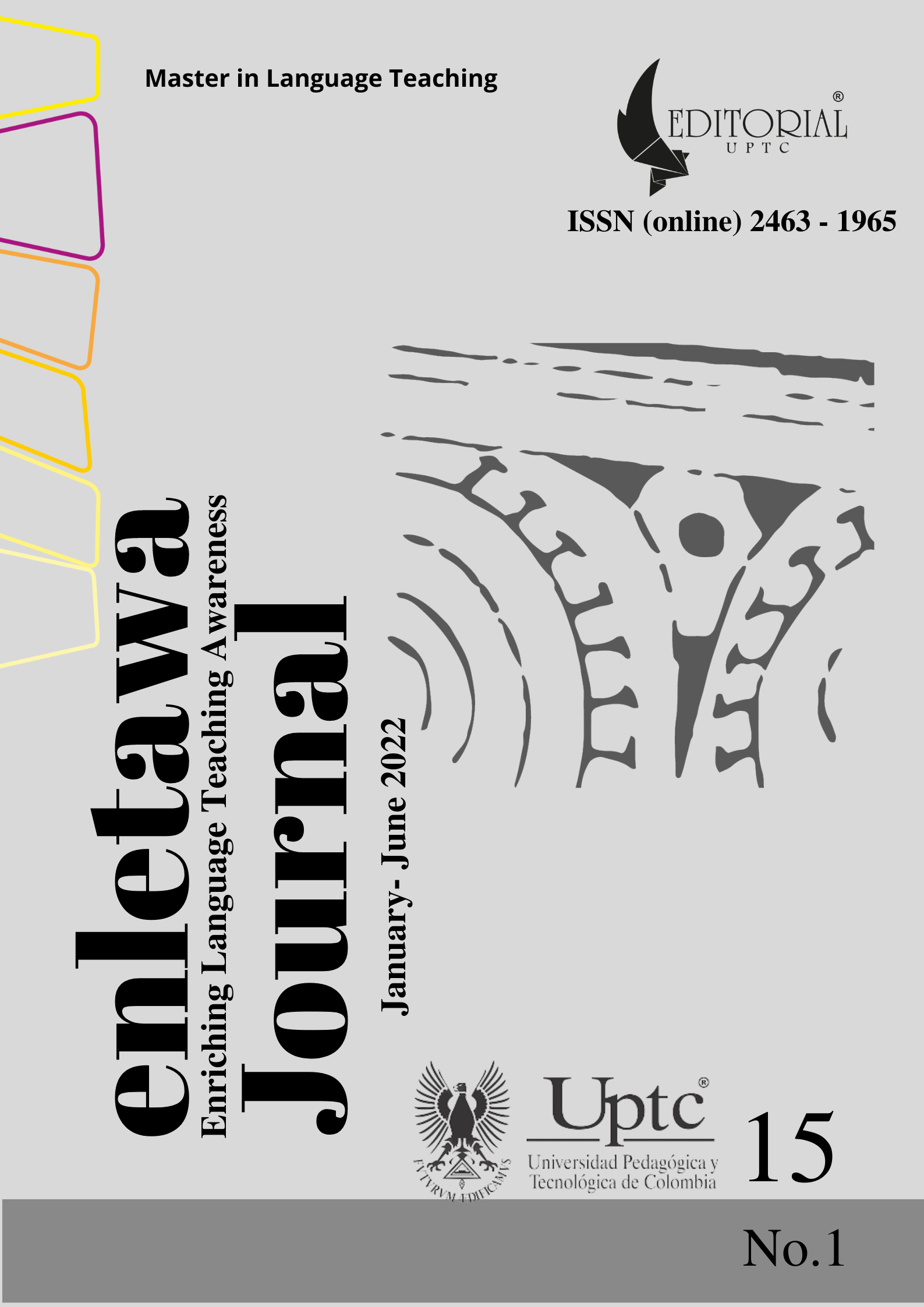Students’ Voices about Education Quality of a Bachelor Program in Pandemic Times

Abstract
During 2020, a series of quarantines that interrupted face-to-face education were experienced. This study aims at examining aspects that impacted the quality of education of a group of five preservice teachers, who moved from face-to-face to virtual learning. We followed a qualitative narrative research design and the participants’ narratives and logs were compiled as data collection instruments. We concluded that methodology, strategies and levels of well-being and health impacted the participants’ educational quality during the onset of the pandemic, and opportunities for the bachelor program to foster better learning-teaching processes were identified.
Key words: education, pandemics, quality, story, virtual learning.
Keywords
education quality , higher education, storytelling, virtual learning, methodology
References
- Aithal, S. C. (2015). Quality Teaching Using Web 2.0 Technology in Education. The South Asian Academic Research Chronicle 2(11), 27-34. https://www.researchgate.net/publication/307436334_Quality_Teaching_Using_Web_20_Technology_in_Education
- Adler, J. M., Dunlop, W. L., Fivush, R., Lilgendahl, J. P., Lodi-Smith, J., McAdams, D. P., & Syed, M. (2017). Research Methods for Studying Narrative Identity: A Primer. Social Psychological and Personality Science, 8(5), 519-527. https://journals.sagepub.com/doi/abs/10.1177/1948550617698202 DOI: https://doi.org/10.1177/1948550617698202
- Arias, A., & Alvarado, S. (2015). Investigación narrativa: apuesta metodológica para la construcción social de conocimientos científicos. Revista CES Psicología, 8(2), 171-181. https://www.redalyc.org/pdf/4235/423542417010.pdf
- Blanco, M. (2011). Investigación narrativa: una forma de generación de conocimientos. Argumentos, 24(67), 135-156. http://www.scielo.org.mx/pdf/argu/v24n67/v24n67a7.pdf
- Bryman, A. (2012). Social Research Methods (4th ed.). Oxford University Press.
- Castaño, K., & Londoño, J. (2012). Approaching Autonomous Learning Through the Instruction of Language Learning Strategies Focused on the Reading and Writing Skills in an EFL Setting in a Public School from Pereira. [Thesis]. Universidad Pedagógica de Pereira, Semantic Scholar.
- Cerrón, W. (2019). La Investigación cualitativa en educación. Horizonte de la Ciencia, 9(17), 1-8. https://doi.org/10.26490/uncp.horizonteciencia.2019.17.510 DOI: https://doi.org/10.26490/uncp.horizonteciencia.2019.17.510
- Chun Tie, Y., Birks, M., & Francis, K. (2019). Grounded Theory Research: A Design Framework for Novice Researchers. SAGE Open Medicine, 7. https://doi.org/10.1177/2050312118822927 DOI: https://doi.org/10.1177/2050312118822927
- Congreso de la República de Colombia. (December 29, 1992). Ley 30 de 1992. Diario Oficial, (40.700). http://www.secretariasenado.gov.co/senado/basedoc/ley_0030_1992.html
- Crisol, E., Herrera, L. & Montes, R. (2020). Educación virtual para todos: una revisión sistemática. Education in the Knowledge Society, 21(15), 1-15. https://doi.org/10.14201/eks.20327 DOI: https://doi.org/10.14201/eks.23448
- Cuevas López, M., Fernández Cruz, M., Díaz Rosas, F., Gijón Puerta, J., Lizarte Simón, E.J., Ibáñez-Cubillas, P., El Homrani, M., Ávalos Ruiz, I. & Rodríguez Muñoz, R. (2019). Liderazgo y calidad en la Educación Superior. EDMETIC, Revista de Educación Mediática y TIC, 8(2), 52-72. https://doi.org/10.21071/edmetic.v8i2.12120 DOI: https://doi.org/10.21071/edmetic.v8i2.12120
- Duţă, N., & Martínez-Rivera, O. (2015). Between Theory and Practice: The Importance of ICT in Higher Education as a Tool for Collaborative Learning. Procedia, Social and Behavioral Sciences, 180, 1466-1473. https://doi.org/10.1016/j.sbspro.2015.02.294 DOI: https://doi.org/10.1016/j.sbspro.2015.02.294
- Flórez, C. E., & Acevedo, J. P. (2020). Experiences of University Education in Virtuality in the Public and Private Context in Colombia. Olhar de Professor, 23, 1-4. DOI: https://doi.org/10.5212/OlharProfr.v.23.15577.
- Friesner, T., & Hart, M. (2005). Learning Logs: Assessment or Research Method. The Electronic Journal of Business Research Methodology, 3(2), 117-122.
- Iturrioz, G., & González, I. (2015). Evaluar en la virtualidad. Revista de la Universidad del Salvador, 2(20), 133-144. https://p3.usal.edu.ar/index.php/signos/article/view/3212
- Jiménez, Y., González, M. & Hernández, J. (2010). Modelo 360° para la evaluación por competencias (enseñanza-aprendizaje). Innovación Educativa, 10(53), 43–53. https://www.redalyc.org/pdf/1794/179420770003.pdf
- Kolb, S. M. (2012). Grounded Theory and the Constant Comparative Method: Valid Research Strategies for Educators. Journal of Emerging Trends in Educational Research and Policy Studies, 3(1), 83-86.
- Martin, J. (2018). Calidad educativa en la educación superior colombiana. Una aproximación teórica. Sophia-Educación, 14(2), 5-14. http://dx.doi.org/10.18634/sophiaj.14v.2i.799 DOI: https://doi.org/10.18634/sophiaj.14v.2i.799
- Mejía, A. & Duque, L. C. (2013). Sistema de aseguramiento de la calidad para la educación superior: una tarea pendiente. Consejo Nacional para el Aseguramiento de la Calidad de La Educación Superior CONACES, 13, 16. https://www.mineducacion.gov.co/portal/micrositios-superior/Publicaciones-Educacion-Superior/341917:Sistema-de-Aseguramiento-de-la-Calidad
- Morales, J., Fernández, K. & Pulido, J. (2016). Evaluación de técnicas de producción accesible en cursos masivos, abiertos y en línea-MOOC. Revista CINTEX, 21(1), 89-112.
- Ntinda K. (2018). Narrative Research. In P. Liamputtong (Ed,) Handbook of Research Methods in Health Social Sciences (pp 2-11). Springer. https://doi.org/10.1007/978-981-10-2779-6_79-1 DOI: https://doi.org/10.1007/978-981-10-2779-6_79-1
- Ruiz, C. & Dávila, A. (2016). Propuesta de buenas prácticas de educación virtual en el contexto universitario. Revista de Educación a Distancia, 49(12), 1-21. http://dx.doi.org/10.6018/red/49/12 DOI: https://doi.org/10.6018/red/49/12
- Salamanca, F. (2015). Personal Narratives: A Pedagogical Proposal to Stimulate Language Students’ Writing. How, 22(1), 65-79. http://dx.doi.org/10.19183/how.22.1.134. DOI: https://doi.org/10.19183/how.22.1.134
- Unicef. (2020). The Impact of Covid 19 on the Mental Health of Adolescents and Youth. https://www.unicef.org/lac/en/impact-covid-19-mental-health-adolescents-and-youth
- Yate, Y. Y., Sáenz, L. F., Bermeo, J. A., & Castañeda, A. F. (2013). The Role of Collaborative Work in the Development of Elementary Students’ Writing Skills. Profile Issues in Teachers` Professional Development, 15(1), 11-25. https://revistas.unal.edu.co/index.php/profile/article/view/37858
